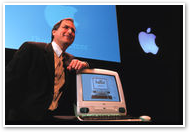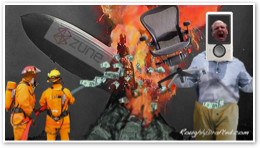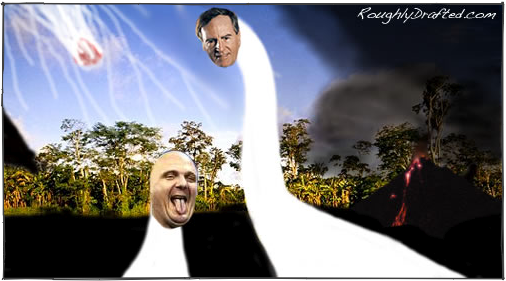
Platform Crisis: The Lazy Dinosaur 6
The Two Edged Sword of Lazy Dinosaurism
For the engineers and managers presiding over millions of dollars of development and research, the fall of Apple was no doubt a fun ride, with lots of money to burn and plenty of leeway for experimental research.
The problem wasn't that Apple couldn't create anything interesting, but rather that it wasn't creating marketable new products and delivering usable technology at a sustainable pace. As anyone who survived the dotcom era knows, anybody can blow through millions and end up with something. The important factor is: is that something worth the money spent? For most of the dotcoms, it wasn't.
Like the lazy dinosaurs of the ancient world, the dotcoms leisurely fed in a lush environment without much thought of the future. When the climate changed, they found themselves unable to survive. Without anything new to eat, and with no capacity to rapidly adapt to that change, they simply died off and sprouted daisies.
Without serious intervention, Apple would have ended up in the same tar pit as pets.com or Webvan. Apple had no plausible escape strategy from the trap it had stumbled into, and now resources were increasingly scarce.
Of course, the company still had significant revenues and billions in cash reserves left to burn through, but by 1996, its investors were demanding decisive action, not the idle consumption of its remaining reserves in attempts to sell the Newton.
Inability to Develop New Markets
Apple didn't stumble because of Copland. Its core problem was its general inability to create marketable products. The much ballyhooed demand for a new OS was almost a red herring, as Apple made little revenues from its software. It really needed to sell the PowerMac, and find other new products it could market.
After NeXT assumed control of Apple, it was able to sell increasing numbers of new Macs running the same old System 7, and by 2000 had reversed Apple's sales losses. The new Mac OS 8 and 9 were both just System 7 with relatively minor updates. 

Apple's new operating system, Mac OS X, didn't significantly factor into sales until 2002. The new Apple reversed its downward spiral by delivering interim products it could sell: the 1998 iMac, retail copies of the Mac OS, and a progressive portfolio of new software that helped sell Macs.
The Shadow Stalker
Today, Microsoft’s behavior is dramatically similar to Apple’s a decade ago. Microsoft similarly sits on huge wealth and revenues and wields significant market control, but the company has been unable to develop new markets.
Its attempts to move into TV DVR boxes and consumer electronics, broaden the Windows PC into tablet consumer devices, sell its software technology for use in phones, PDAs, game consoles, and music players, and sell DRM for media rentals have all been billion dollar failures.
 Microsoft's three profitable segments, Server products, desktop copies of Windows, and sales of Office, are very much like three Apples from 1995. Still making billions, but operating as if they are completely unaware that they now face intense competition for the first time.
Microsoft's three profitable segments, Server products, desktop copies of Windows, and sales of Office, are very much like three Apples from 1995. Still making billions, but operating as if they are completely unaware that they now face intense competition for the first time. Combined with a reliance on isolationist, proprietary platform development and strangled by the tentacles of legacy, Microsoft's position as a lazy dinosaur is retarding its ability to compete against faster moving rivals, including the daily builds of Linux attacking its efforts in the Enterprise, and the new Macs being pumped out through Apple's retail stores to take on premium PC sales on the desktop.
Stock Buyback Starvation
Microsoft has recently announced efforts to buy back its own stock, indicating that the company has run out of investment options. In other words, Microsoft is giving its cash reserves back to its investors rather than investing in new attempts to win new markets and develop new products.
Like a hungry dinosaur stuck in a snow bank, Microsoft is in starvation mode, eating itself rather than using its energy to look for new food. It knows there's no more easy new food options available. Microsoft is dying.
There's one platform crisis factor left: Microsoft today has installed itself as a robber baron just as Apple had.
This Article
Next Articles:
Platform Crisis: Robber Baron Piracy
This Series










Wednesday, November 29, 2006

 Bookmark on Del.icio.us
Bookmark on Del.icio.us Discuss on Reddit
Discuss on Reddit Critically review on NewsTrust
Critically review on NewsTrust Forward to Friends
Forward to Friends
 Get RSS Feed
Get RSS Feed Download RSS Widget
Download RSS Widget





